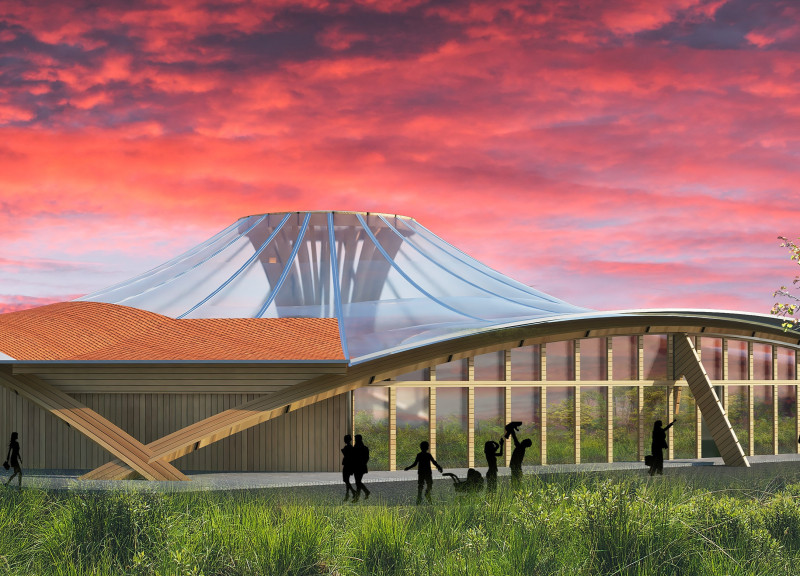5 key facts about this project
The Grænn Eldfjall Restaurant is a contemporary architectural project situated in Iceland, designed to offer a unique dining experience while harmonizing with its volcanic landscape. The structure exemplifies a coherent relationship between functionality, aesthetics, and sustainability. Its design approach integrates local environmental factors, ensuring an effective balance between the built form and nature.
Design Approach and Conceptual Framework
The design of the Grænn Eldfjall Restaurant draws inspiration from volcanic forms, employing a circular and conical shape that reflects its surroundings. This geometric layout fosters a sense of unity with the landscape, while the design also emphasizes a connection to the elements, notably through the use of natural materials. The architecture serves as a direct response to Iceland’s unique climate and terrain, strategically positioned to maximize views of the surroundings.
Materiality is a critical aspect of this project. The predominant use of Cross-Laminated Timber (CLT) ensures that the structure is not only sustainable but also resilient in the face of Icelandic weather extremes. The lightweight, transparent Ethylene Tetrafluoroethylene (ETFE) covering facilitates natural light, enhancing the indoor environment while reducing energy consumption. This material selection prioritizes ecological impact and aligns with the restaurant's commitment to sustainable practices.
Innovative Functional Spaces
The internal layout of the Grænn Eldfjall Restaurant has been designed to optimize functionality while maintaining an engaging dining atmosphere. Key spaces include the dining area, which offers panoramic views of the landscape, and a greenhouse that supplies fresh produce for the menu. This farm-to-table approach underscores the project's focus on local sourcing and sustainability.
Unique aspects of the design include efficient operational zones, incorporating kitchens and service areas that enhance logistics without disrupting the dining experience. The building’s orientation has been carefully planned to enhance solar gain, taking advantage of Iceland's natural light and minimizing energy use throughout the year.
Sustainability and Energy Efficiency
Sustainability is a cornerstone of the Grænn Eldfjall Restaurant's design philosophy. The integration of geothermal energy systems exemplifies the project's commitment to renewable resources. This system provides heating and hot water, significantly reducing energy consumption and aligning with Iceland's existing infrastructure.
Additionally, the project's thoughtful incorporation of natural ventilation and passive heating techniques demonstrates an advanced understanding of environmental control. By combining these elements, the restaurant aligns its functional requirements with ecological considerations, representing a forward-thinking example of modern architecture.
For those interested in a detailed exploration of this architecture project, including architectural plans, sections, designs, and innovative ideas, it is encouraged to review the project presentation for further insights into the design and its unique attributes.





















































